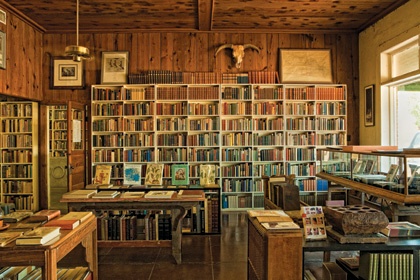In the center of Archer City, population 1,800, stand four plain, one-story brick buildings that hold roughly 200,000 antiquarian books. Together, the buildings compose Booked Up, a bookstore owned by novelist Larry McMurtry, who was raised on a cattle ranch near Archer City, the seat of Archer County.
McMurtry’s books, residing in their buildings indecorously, in library-style stacks, draw serious readers and book dealers from many parts of the world—such as California, New York, Ireland and Australia—to the tiny town of Archer City, which lies on the Rolling Red Plains northwest of Dallas. The four Booked Up buildings, which either face the county courthouse or sit within a block of it on the town square, give Archer City’s downtown area a distinct personality.
Archer City’s economy is lean, depending on oil, natural gas and cattle, and the town is showing some signs of struggle, like the recent closures of a Sonic Drive-In and a Chevrolet dealership. But bookstore customers boost business here. For a few days or a week, they stay at the Spur Hotel or the Lonesome Dove Inn, which rely on their patronage, and they nudge up profit margins at Allsup’s Convenience Store, Oodles Supermart and the Wildcat Cafe.
Booked Up’s manager, 31-year-old Khristal Collins, who has worked here since she was a teenager, seems to have internalized some of the store’s suffusing stillness. When I visited recently, she was patient and gracious and helpful, but said no more than she had to, and after showing me into the main room of the first building, she left soundlessly, before I realized she’d gone.
Tall bookcases of simple white wood, stabilized by two-by-fours nailed to their tops, extended in vertical, monotonous rows in both directions. Colored construction-paper signs, hanging by hairy twine, listed subject categories in diverse, upbeat fonts: Nature, Trees, Animals, The Sea … Texas, Wildflowers, Cacti, Fungi.
Tame caprice governs the Booked Up collection. The first thing you see when you walk into the second building is a fact sheet pinned to a bookshelf:
Q: How are the books arranged?
A: Erratically/Impressionistically/Whimsically/Open to Interpretation
Q: Do you have a list of these books?
A: No.
In building No. 1, I found a chair and sat. On the shelves all around and on a display table and cart I saw: Bee Flies of the World: The Genera of the Family Bombyliidae (1973); In Search of Ali Mahmoud: An American Woman in Egypt (1973); The Charles (1941), from a series of books called Rivers of America; Hit to Kill: The New Battle over Shielding America from Missile Attack (2001); and A Social History of the American Alligator (1991).
I walked out of building No. 1 and onto Center Street, which is wide and windblown. Although there has been one recent business closure downtown—the Sonic, near the courthouse—other structures, such as the First Baptist Church and 129-year-old First United Methodist church, are perfectly maintained.
The bookstore’s second building, just across Center Street from building No. 1, has thousands of fiction and poetry and art books, but its core, the big front room, features rare and unusual books. Here, you can study Rasputin, Nero, Nehru and Kublai Khan. I saw that in the darkly cathartic year of 1968, a Purdue University professor named Peter Georgeoff had published a work called The Social Education of Bulgarian Youth. In the introduction, he writes that Bulgaria is part of “the Shatter Belt, a narrow strip of land between the USSR and Western Europe occupied by weak, disorganized nations.”
I left building No. 2 to eat some pizza at the Lucky Dollar convenience store and gas station. While I ate, I read The Archer County News. “Having hog problems?” a prominent ad in the classifieds section asked. “We will trap your property or keep them run off with dogs,” it promised. The front-page headline read: “Scotland-Windthorst VFW and Ladies Auxiliary announce Voice of Democracy essay winners.”
Buildings Nos. 3 and 4, right on the courthouse square, house a huge amount of 19th-century magazines and books. In 1858, I learned, Harper’s Magazine commissioned a travelogue called “Winter in the South” that it illustrated with engravings of a steamboat loading cotton bales, Native Americans carving canoes and the sun setting over Spanish-mossy Lake Pontchartrain. Memoirs of M. de Blowitz caught my eye. It has a fine-leather front cover, color-embossed with the de Blowitz crest: crown, lion, eagle. It was strange to read de Blowitz’s first sentence: “My origin, infancy, and youth have been narrated so often that no one will, I hope, find fault with me if … I myself give an account of them.” The next paragraph begins, “On December 28th, 1825, at the Chateau of Blowsky, in the region of Pilsna, in Bohemia, there was born a child with a big head and a feeble body.”
Next door to building No. 3 is the abandoned Berry Building, whose awning still reads “coffee community culture conversation.” On its picture windows, students from Archer City High School had painted “WILDCATS.” On the other side of building No. 3 are Archer Flowers Gifts & Jewelry, American National Bank, an Allstate insurance office and a State Farm Insurance office, its picture window sloganeered “Fire Up To Win,” ringed with Wildcat paw prints. The Booked Up buildings, moored to the earth by the cubic bulk of McMurtry’s eclectic repertoire, have a diminishing effect on the surrounding structures.
Building No. 4 is broad, high-ceilinged and heavily informational. In all the Booked Up buildings, but especially in No. 4, the scantily labeled shelves are so long and high, the books so tightly compressed, the dates and styles and colors and sizes so diverse, the multiple copies so few, that to take a book from a shelf and skim it for a moment is to lose all sense of its place. I often had to stand in front of a bookcase for a long minute, retracing the track my eyes had first traveled.
The last place I stopped before leaving town was the Allsup’s, just down the street from building No. 1. I was chatting with the cashier when the store manager, Donna Marney, came in. I asked her about Booked Up. “It’s amazing where people come from to go to these stores,” she said. “New York—way out of state. I’m thinking, ‘My God! Talk about avid readers!’”
It turned out that Marney’s son-in-law is Larry McMurtry’s nephew. Like everyone else I talked to, she had good things to say about McMurtry, including that he still acts like he’s from Archer City. As popular as McMurtry’s bookstore is with people from other places, Marney said she couldn’t think of many locals other than McMurtry’s family who visit Booked Up. “I’m not a reader,” she said, “and I don’t have the time.”
Out in the car, on my way out of town, I thought about time. When you look into a Booked Up window, from the sidewalk or from a car, you see a dully forbidding block of volumes, McMurtry’s sensational, mercurially amassed collection: no sheen, no evident order.
Without the luxury of time, what can you do with that?
——————–
Jeff Tietz has written for Harper’s Magazine, Rolling Stone and The New Yorker. He lives in Austin.


